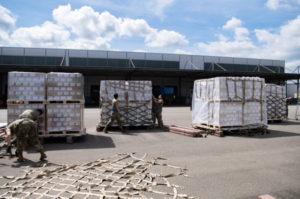For 25 years, it was a favorite annual rite for students and staff at Brooklyn International High School: Sitting along tables in a hallway of their Downtown Brooklyn building and passing around dishes from across the globe for a Thanksgiving feast.
They celebrated the quintessential American holiday with their own twist. Most people at the school, which exclusively serves newcomer immigrants, would bring a traditional dish from their home country for everyone to try. Alumni would return, too, a demonstration of the strong ties the school has created.
But the pandemic put that beloved tradition to a halt. The school’s student government, which plans the annual feast, realized in September there would be no way to hold the event. Brainstorming fun ways to bring the school together online, they decided to host a virtual cooking competition.
“It’s really legit that it’s the one time people get together, and food does that — it brings people together,” said Samantha Melo, who helped plan this feast when she was a student there about 10 years ago. Melo is now one of Brooklyn International’s Community Schools directors, helping coordinate partnerships with the Center For Supportive Schools, which provides extra health, academic, and social services for the school. More than 80% of the students come from low-income families.
Students and staffers considered postponing the feast until it was safe to gather again, said Megan Minturn, a dance teacher who has taught at the high school for nine years and an advisor to the student government. But in a year filled with so much distance, they decided that they needed to do something to mark the annual celebration.
“I feel like so much has been taken away from all of us this year,” Minturn said. “Finding a way to continue to come together is so essential because there is so much challenge and — honestly — suffering that people are going through within our community.”
Many students, who are English learners, are still struggling to find reliable internet access and need more in-person support, Melo said. Through the city’s Community Schools program, the staff try to support whatever struggles students are having, from behavior or attendance issues to helping families access government assistance. But remote school provides another layer of difficulty for many students. As many parents and guardians are out of the house working during the day, students don’t have someone at home who “could help them with the homework and explain things to them in a way they would understand.” Teachers are trying to provide as much support as possible, she said, even texting students just to check in.
But given the opportunity, students seem to be engaging in activities virtually, Minturn added. Two of the school’s virtual events in the spring — a spirit week and an online art expo — had attracted a lot of student participation on social media and through videoconferencing, which is why the student government thought a virtual Thanksgiving activity might be successful.
A remote cooking competition may seem like a peculiar choice, since no one can taste anyone’s dish. But the student government decided a friendly competition — based on presentation and plating – would maintain the basics of the tradition, but still inspire people to participate.
“Feast is more about food,” said a senior at the school who helped organize the competition, whose guardians did not permit him to share his name. “Only thing we can do and make people have fun is a competition.”
Members of student government began planning together, creating fliers for the event and sharing them on social media to spread the word. Other students made a website for the competition. Teachers encouraged students in their classes to participate. The student planners got an assistant principal and a teacher to judge the competition. And the student government put up three $20 gift cards, using money it had fundraised in the past, as prizes for the judges’ top three picks.
The school community gathered Tuesday on Zoom for the competition. Seventy students participated. They submitted dishes from across the globe: green plantains from Haiti, pupusas (stuffed cornmeal flatbread) from El Salvador, and los tres golpes — a breakfast dish with fried salami, fried cheese, and eggs — from the Domincan Republic were just a few examples.
After introductory remarks and pictures of past feasts, the judges went into a Zoom breakout room to decide winners for an appetizer category, a main course, and a dessert. They chose a crispy tofu dish made by a student from China, a Dominican shrimp dish, and a Bangladeshi dessert.
The senior, who helped organize the event, felt “proud” the school was able to create something meaningful online.
“I feel like with this,” he said, “everyone feels like they can at least hear each other’s voice.”
Chalkbeat is a nonprofit news site covering educational change in public schools.
This article was initially published at ChalkBeat






Be First to Comment